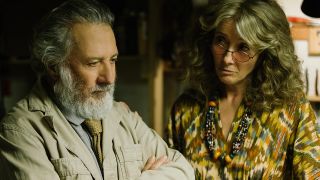Netflix is getting booed at the Cannes film festival. Here’s why that's wrong

At this morning’s screening of Bong Joon-ho’s wonderful creature feature-come-corporate satire Okja a chorus of jeers erupted at the sight of the reassuringly familiar, but in this context exhilaratingly anarchic, Netflix logo. The online streamer has its first ever films in competition at Cannes this year – Joon-ho’s Okja and Noah Baumbach’s starry The Meyerowitz Stories (New and Selected) – a fact that’s riled stuffy traditionalists who see no place for ‘TV movies’ at the world’s most prestigious film festival. It’s a way of thinking that patently belongs in the bin.
For starters, there’s no question that Okja belongs on the big screen. Exquisitely shot by Bong and master cinematographer Darius Khondji, it has visual scope and thematic ambitions to rival anything shown at the festival so far. Plus a pig that poops like a machine gun, what’s not to love? While being herded out of the 2000-seater Grand Théâtre Lumière like cattle (an unsettling experience so soon after watching Okja’s deeply upsetting slaughterhouse scenes) I overheard an odd exchange: one journo expressing surprise at how “cinematic” the film looked only for the other to adamantly decry it as “televisual” - a claim that wouldn’t hold water if you were watching it on a 20” CRT. The only explanation for such bafflingly backward thinking – prejudice towards a distribution model that doesn’t threaten cinema so much as offer a daring new space for challenging filmmakers to get their movies made (and, crucially, seen).
It’s easy to see why Joon-ho would seek refuge under Ted Sarandos’ umbrella. His last film, 2013’s sensational Snowpiercer, still hasn’t been released in the UK four years after the fact, despite starring Captain America and boasting an eminently marketable class-war-on-an-apocalyptic-train premise. If Netflix getting in on the original movie business means directors as talented as Bong Joon-ho are granted near-limitless resources to make idiosyncratic gems, and are all-but-guaranteed a gargantuan global audience, any self-professed film lover should support their mission.
It’s a debate that’s been raging for weeks, if not a number of years now. Cannes may have finally welcomed Netflix into the fold, but the fest quickly made a public U-turn by announcing that any films in competition next year must be released in French cinemas. It effectively serves as an ultimatum to Netflix and, to a lesser extent, Amazon Studios – abandon your day one global streaming policy, or don’t come back. It’s more complicated than mere snobbery. Netflix isn’t subject to French cultural exception – a law that requires a percentage of all revenue generated from the film industry be reinvested in homegrown cinema and, more importantly, a 36-month delay between theatrical release and streaming date. Not participating is, perhaps justifiably, seen as an insult to the French film industry.
Netflix does have a history of theatrical releases, of course. Cary Fukunaga’s Beasts of no Nation launched on big screen and small simultaneously, while Okja and Meyerowitz both have limited theatrical windows in the States. But in recent years Netflix has moved further and further away from this idea, in part due to hostility from major cinema chains, and focused on what it does best – delivering content directly to the home.

During the Cannes Film Festival’s opening ceremony, jury president Pedro Almodóvar bluntly ruled out any hope of either Netflix film winning the prestigious Palme d’Or before they’d even had a chance to screen. “I personally do not conceive of the Palme d’Or or any other prize being given to a film and then not being able to see this film on the big screen,” Almodóvar said. “For as long as I live, I’ll be fighting for one thing that I’m afraid the new generation is not aware of: it’s the capacity to be hypnotised by the big screen.”
Netflix had an unlikely champion on the jury in the Fresh Prince himself, Will Smith, who has a vested interest in the online streamer given it footed the bill for his next film – orc buddy cop thriller Bright. “I have a 16-year-old and an 18-year-old and a 24-year-old,” Smith said. “They go to the movies twice a week and they watch Netflix. There’s very little cross between going to the cinema and watching what they watch on Netflix. In my house Netflix has been an absolute benefit because they get to watch films that they never even would have seen.”
Sign up for the Total Film Newsletter
Bringing all the latest movie news, features, and reviews to your inbox
Big Willie has a point. Like DVD before it, Netflix makes access to (an admittedly limited selection of) world cinema easier than ever before, something the Cannes Film Festival of all places should celebrate. And it’s a shame that someone as staunchly anti-streaming as Almodóvar should be leading the jury during Netflix’s historic first year in competition, effectively hobbling two of the prize horses before they’ve left the starting gate.
It should also be made clear that Netflix’s hands aren’t clean in all this, the policy of simultaneous global streaming releases coming with its own problems. It’s a crying shame that 99% of Okja’s audience will never get to experience it the way it deserves to be seen – projected on a screen larger than your house – something filmmakers will have to consider before signing a deal with the ‘red devil’. But the idea that Netflix’s films should be looked down on and audibly booed during a film festival as esteemed as Cannes says far more about the (minority of) people watching their films than it does about the films themselves, or Netflix’s place in the movie-making landscape.
Two hours and one screen malfunction after the Netflix logo appeared, Okja’s credits were greeted with a wall of applause, a vocal acknowledgment, finally, that Netflix had earned their place at Cannes based on quality alone. Though the less said about those eight Adam Sandler movies the better.

I'm the Deputy Editor at Total Film magazine, overseeing the features section of every issue where you can read exclusive, in-depth interviews and see first-look images from the biggest films. I was previously the News Editor at sci-fi, fantasy and horror movie bible SFX. You'll find my name on news, reviews, and features covering every type of movie, from the latest French arthouse release to the biggest Hollywood blockbuster. My work has also featured in Official PlayStation Magazine and Edge.
Most Popular

